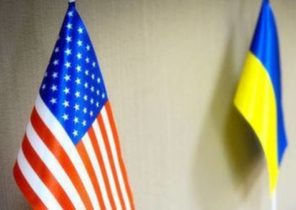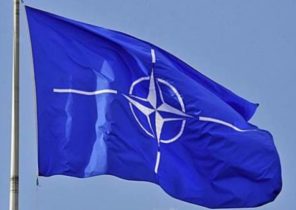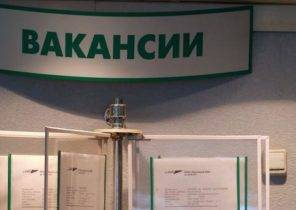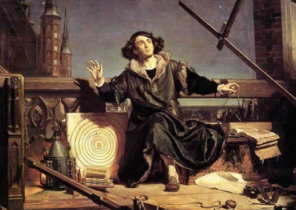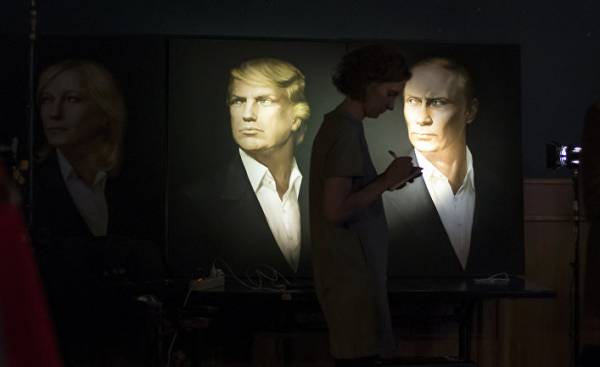
Current tensions in Russian-American relations reminiscent of the worst days of the cold war. In March 1983, President Ronald Reagan called the Soviet Union an evil Empire, prompting a sharp response from the Soviet leader Yuri Andropov and the Politburo, which said in June that the American media has reached “the highest point of hysteria.” In September of that year, the MiG shot down a Korean airlines airliner accidentally flew into Soviet airspace, killing 269 innocent people. As shown by declassified American intelligence, in November, Andropov led the Soviet nuclear forces on high alert, fearing that the United States is going to strike the first blow under the guise of military exercises of NATO Able Archer. The analysis shows that the November event was not as dangerous as they are often presented, however, experts agree that the risk of inadvertent war was extremely high. The fear of nuclear war due to some miscalculation, the sense of insecurity often experienced by Russia, and possible emergencies that could worsen the crisis, are the factors that prompted Reagan and Margaret Thatcher to negotiate with the Russians about the end of the cold war.
Speaking in June at the St. Petersburg international economic forum, Vladimir Putin angrily condemned the “hysteria” in Washington and in the American media. Sounded angry accusations and contemptuous ridicule. American and Russian experts agree that the risk of inadvertent nuclear war today intensified, and that now the danger is much more serious than in the early 1980s. But today, this danger is not perceived like at the time. Today, less awareness, less of anxiety. Few people know about nuclear policy as much as former defense Secretary William Perry (William J. Perry). And he was this year made an important note of caution, saying: “We are starting a new cold war. Looks like we slipped in a new nuclear arms race…. We, Russians and all the rest know not what we do”.
The risk of nuclear miscalculation today greater than ever since the Cuban missile crisis, because the weapons became more deadly, and after the Russian annexation of the Crimea was stopped almost all the formal mechanisms of bilateral cooperation and communication. But that’s not all. In 1980-e years, few could have imagined today’s advances in robotics, artificial intelligence, data processing and geospatial analysis. Complex interactions and tight coupling of systems associated with modern nuclear arsenals (this is the system for early detection and management) increase the likelihood of accidental nuclear war. Moreover, the Russians and the Americans today are facing new nightmarish scenarios such as terrorist hacker attacks on the command post of nuclear weapons or submarine with ballistic missiles.
If the Kremlin receives information about a possible American attack, he’ll have every reason to believe that the assessment of the situation prior to the destruction of Moscow he remains from seven to ten minutes. Washington extra time will be slightly longer, as the new President has not yet worked in crisis situations. Instead of the regular contacts and public discussions initiated by Reagan and Gorbachev at the summit in 1985, Washington and Moscow today are increasingly approaching a dangerous point of military clashes.
This dismal picture. It seems that America and Russia blindly repeat the mistakes of the past, creating a nuclear déjà vu, which is much more dangerous than before.
There is a deep ideological divide between Washington and Moscow. Today, as in the early 1980s, there are calls to train more experts on Russia to help the us government to understand the mindset of Moscow, the nature of representations, the cognitive process and the reasons for her behavior. Scholar Stephen Blank (Stephen Blank) argues that experts on Russia need to learn to fight back “a permanent and ongoing information war” that the Kremlin is waging against US and against literally every European state. In order to understand Russian tactics and policies, Washington must learn to “think like a Russian.” Democratic Senator from the intelligence Committee, mark Warner (Mark Warner) took up the study of Russian history in an attempt to investigate the relationship between the staff of the President of trump and Moscow.
Russians themselves say that Americans don’t understand their interests and know how to work with them. The late representative of Russia to the UN Vitaly Churkin informally commented on the actions of American leaders during the conflict in Libya, Syria, Ukraine and Crimea. “They just don’t understand us. They treat us wrong.”
But as Washington to “understand” Russian? How to deal with them “correctly”? In 1983, an expert on negotiation by William URY (William Ury) and I was asked to organize a meeting group for the prevention of nuclear crisis, which included senior experts and former executives at the level of the Chairman of the joint chiefs of staff. At that time we knew Churkin as a brilliant analyst who was soon appointed the official representative of the Soviet Ministry of foreign Affairs. Gorbachev at that time was still a little-known new member of the Politburo of the agricultural hinterland.
During the first intense conversations, we presented Russian negotiating tool, calling it “table preconceived notions”. In it we outlined the recriminations, resentments, and grievances of both sides, placing them in adjacent columns. We did it to start a dialogue to establish mutual fact-based understanding and to generate at least some shred of trust in the group, which held regular informal meetings since 1983, when Russian-American relations were at the lowest point, and up until the fall of the Berlin wall.
We started with a Frank conversation about the past with someone who allegedly wronged, someone who is misled, who lied to who and what the agreements and international laws are violated. We held a series of meetings with real participants in the Cuban missile crisis, among whom was Robert McNamara, Andrei Gromyko, Fidel Castro. The first time we have heard from all three points of view, and realized that Advice is actually delivered to Cuba nuclear warheads that Castro called for a preemptive nuclear strike on the United States, and that the Soviets had tactical nuclear weapons, which, according to General opinion, they would be applied against the 180-strong force of American troops, ready to launch an invasion in the event of receipt of an order from President Kennedy. It turns out that we were much closer to full-scale nuclear war than we previously thought.
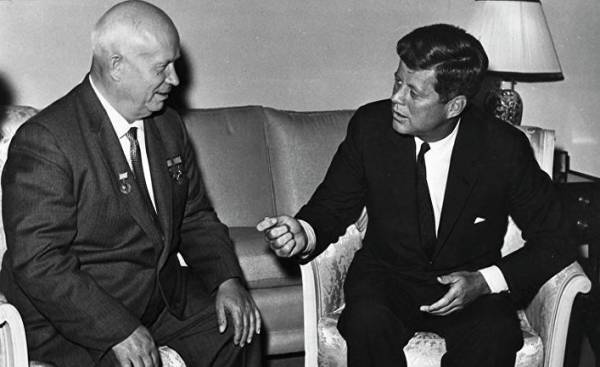 © public domain, Nikita Khrushchev and John Kennedy
© public domain, Nikita Khrushchev and John Kennedy
The table that we have prepared in 1983 for dialogue with the Russian, is very similar to the other document which my colleagues and I made in 2017. As before, each side considers the other side as the aggressor, provoking a new arms race, invading a sovereign state and violating human rights. “We are losing opportunities, accusing each other of all mortal sins,” — said in March, Farid Zakaria (Fareed Zakaria), the Kremlin press-Secretary Dmitry Peskov. Not at all. And then there are new features, some in Soviet times, for the most part could not be. Now both sides see how one intervenes in the elections of another. The United States still can not recover from the insights of American intelligence reported that Russia during the elections of 2016 launched operation impact, an effort to hurt Hillary Clinton and help Donald Trump. The Soviets never accused Washington of meddling in their elections, because these elections were not there. And the Russians are now talking about the violation of America’s sovereignty because the Americans helped Boris Yeltsin to catch up with rivals and win the election in 1996. The United States officially and quite openly assisted candidate Yeltsin, whom they favored, and which bill Clinton called “old Boris”. He received help from expensive U.S. consultants from the IMF. Then Washington has supported “their” opposition candidates during the color revolutions in Georgia, Kyrgyzstan and Ukraine. The events in Ukraine, Russian is considered a “coup” perpetrated with US support.
And yet there are important differences between Russian and American values. Russian today is more conservative on foreign policy and social issues. They seek stability in the middle East unlike the Soviets, who overthrew the regimes in third world countries and built a utopian Marxist-Leninist socialist society. Russians make fun of the neo-conservatives of the Bush years and the liberal internationalists of the Obama, calling them utopians engaged in ill-considered action for regime change with the aim of building democracy in the middle East. They argue that such actions America has resulted in chaos and created havens for terrorists. As said Deputy Prime Minister Dmitry Rogozin, “the United States treat the Islamic world like a monkey with a grenade”. Polls show that anti-American sentiment among Russians has reached record highs, due not only to the propaganda of state media, but also to real differences in social values. Russian Orthodoxy is more conservative in gender and other social issues, because of what American conservatives such as Pat Buchanan (Pat Buchanan) praising Putin, saying that “he firmly hoisted a Russian flag on the side of traditional Christianity”.
In the 1980s the years we have established a process in which both sides could Express their grievances and claims, to challenge the statements of the other party, to correct inaccuracies, and then to depart from his emotion opposite positions, paying attention to the fundamental interests of each other. We used humane folk wisdom of our cultures, say, an American Indian proverb “do Not judge another until you walk a mile in his moccasins”. Russians are known for their practical, everyday Proverbs, and in difficult moments it helps to overcome the contradictions.
Today, due to annexed Crimea, shot down the plane Malaysian airlines and atrocities in Syria, the mutual trust between the two of us fell to the lowest level. Even those who are inclined to dialogue, believe that Moscow is violating the INF Treaty. In 1983 the evaluation was also filled with pessimism. In 1979 the Soviets invaded Afghanistan, and when a Soviet fighter shot down a Korean airlines plane, killing hundreds of innocent civilians, including an American Congressman. Cultural and other exchanges were completely frozen. Most Americans saw in the Soviet Union only a cruel and inhuman enemy. And Soviet representatives had accused Reagan and his Advisor is “insanity”, “extremism” and “crimes”.
During today’s recriminations, the Russian side is returned to the events of 1989-1991, the criticism of us actions and to opposite points of view on the post-Soviet world order. Russian analyst Dmitry Suslov offers his perspective on how Russians look at the world order. Speaking last year in the journal Strategic Analysis, he wrote that after the collapse of the Soviet Union, the United States tried to get the status of the world’s only superpower, but are unable to obtain from non-Western centers of power consent to its global leadership. Russia is different from America my views on sovereignty, the use of force and rules of international decision-making. “Since none of the parties are not unilateral compromise, and rely on weakening the opponent, wrote Suslov, — continued Russian-American confrontation will deepen the rift in the Atlantic and the Pacific”. The movement of Russia to the Alliance with China, he sees the formation of a new epicenter of global politics. You might think that Suslov read the script from the report of the National intelligence Council in 2017 the “Global trends”, which also refers to the loss of America’s status as the world’s only superpower, about the changes in European and Asian alliances and the challenges that populist authoritarian regimes abandon the liberal norms and institutions. According to Senator John McCain, United States in response to these challenges came into the battle with Putin’s Russia for the preservation of “the postwar rules-based world order based on American leadership and the primacy of our political and economic values.”
In the Russian view, this split took shape in 1998 when the Senate approved the NATO expansion. Russian analysts like to point out that when the American leaders did not listen to the person who knew how to think like a Russian, and for decades, put yourself in their place. A renowned expert on Russia George Kennan (George F. Kennan) called the Senate decision a “tragic mistake” and said: “This suggests a poor understanding of Russian and Soviet history. Of course, Russia will react negatively, and then supporters of NATO expansion say that they always say how bad these Russians. But all this is just wrong.”
Now Washington sees Russia as a potential threat as in the 1990-ies, but very real. Moscow is actively modernizing its nuclear Arsenal, more and bigger military exercises, building up forces on its borders, declaring that all this — the response to the expansion of NATO territory. From the point of view of Kennan, is a self-fulfilling prophecy, the result is absolutely predictable and destructive cycle of conflict. It is human dynamics a motivating factor leading to the arms race and studied in detail by specialists in international relations, negotiations and conflict resolution.
Russians remember the period 1989-1991 and say that they have acted dishonestly, when the United States began to move NATO eastward, starting with the negotiations about the unification of Germany. However, they easily forget the epic nature of the time. The world watched the crumbling of the Soviet Union, the Empire with five million combat-ready army, which was possible, Imperial intentions and ideology to truly threaten the world. We must pay tribute to the resolve of the West, the reluctance of President Gorbachev to use force, as well as the courage of the Russian people, carried out, as many believe, the greatest nonviolent revolution in history, which opened the door to a democratic Russia, gave freedom to the former Soviet republics and created the conditions for unprecedented conclusion of agreements in the field of arms control.
During very important negotiations about the unification of Germany, many in the American administration were happy to pocket those gains and leave Gorbachev weakened the positions. They took advantage of the fact that the Soviet leader did not require additional concessions, namely, that he did not forward important: the unification of Germany is only possible in the case of an agreement that it will never join NATO.
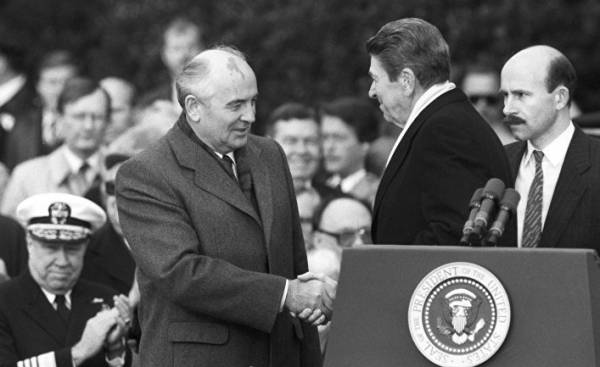 © RIA Novosti | go to fatabonapicallo visit to the United States Mikhail S. Gorbachev
© RIA Novosti | go to fatabonapicallo visit to the United States Mikhail S. Gorbachev
If Gorbachev began to insist on this, the West could go to meet him. Or at least, American negotiators would have been much more difficult, as evidenced by the Ambassador Robert Blackwill (Robert Blackwill), had direct relevance to these negotiations. Says a lot about that at that time France for sure, and Britain certainly would agree with the existence of a neutral German state. Speaking about the success of the United States, who succeeded in the negotiations with Gorbachev in Germany — unified Germany became a NATO member — Blackwell said:
The task of a statesman is often is not to create opportunities, and to see them and use them. And I think it was President Bush, Secretary Baker, General Scowcroft, and their German colleagues.
Gorbachev had different ideas about statecraft. He felt the need to create and implement a historic opportunity to shape a new common security, to negotiate a long-term relationship where both parties solve common problems. At first, he was negotiating from a position of strength, inspiring millions with their actions on the settlement of the conflict and the end of the cold war. In 1988, chief aide to Gorbachev on foreign policy Anatoly Chernyaev wrote in his journal after meeting the Soviet leader with German Chancellor Helmut Kohl: “I felt physically that we are entering a new world where class struggle, ideology, polarization and enmity are no longer decisive. What prevails is something universal”. Due to its aspirations, Gorbachev became one of the most respected and influential people on the planet. And suddenly everything went down the drain. Gorbachev was a bold and presumptuous leader and supporter of change. He appealed to the best feelings and inclinations of human nature, and it cost him his job. William Taubman (Taubman William) wrote a biography of Gorbachev, which will soon go on sale, and in it he carefully, subtly and in detail, painting a picture of its strengths and weaknesses. By 1989, Gorbachev was negotiating from a position of weakness because of the growing chaos in domestic politics and on the economic front.
The inertia of the past has prevailed. The administration of George H. W. Bush put Russian-American relations are on pause, abandoning the more daring course of Reagan on cooperation. I remember, as the Russian reformer Grigory Yavlinsky said irritably:
We let go of Eastern Europe, abandoned the repressive Soviet system, what you have achieved in decades. We are ready to work together, and your government say: “Wait and see, but for now please spend these additional reforms which we recommend.
In the absence of the new concept of shared security and “a great deal” to support democracy in Russia (Grigory Yavlinsky and Graham Allison in 1991, has offered his version of) the United States has led the expansion of NATO deep into the historical sphere of interests of Russia, enrolling in such a way that it increased the risk of war. Just look at today’s Baltic States. According to experts, there is the danger of inadvertent escalation has become a major foreign policy risk for the United States. Someone saw other benefits from walking in others ‘ moccasins: the enemy were a mile, and his moccasins from you.
In 1989, America was trying to take the place of Russia; today, the two powers are far from each other as ever. Those who believe that Russia is same as Soviet Union — seeking to expand the state, to restrain which only military force, claiming to be right, pointing to Russian hostility. They believe that the West has followed the right course, taking the former Moscow vassals in NATO and the EU, while Russia was weak and confused after the collapse of the Soviet Union. Those who think that new independent Russia in 1991, did not pose any threat, saying: this is a classic spiral of action-reaction, inability to skillfully negotiate, to build relationships of cooperation and to realize common interests, despite the best initial intentions of both parties, seeking partnership.
In the field of negotiation, we often observe that the most important role in this process is played not only interests, but also ordinary human emotion, leading to a cycle of action-reaction. President Putin has angrily said that America does not need allies, and vassals; and in September last year, he, remembering the historic events of 1989-1991, stated that it was not Moscow’s fault in such a deplorable state of Russian-American relations:
We had hoped that this openness will cause a reaction from our partners. Nothing of the sort. They looked into the crystal of their national interests, and understood it differently: the Soviet Union collapsed, now we have to put the squeeze on Russia.
Americans usually incorrectly interpret the famous statement by Putin that the collapse of the Soviet Union was “the greatest geopolitical catastrophe” of the twentieth century. Putin has not lamented the loss of the authoritarian Soviet system. He wanted to say that Russia must develop as a free and democratic country, without showing any weakness in the protection of their national interests.
Today Gorbachev spoke bitterly of the betrayal of the West. In 2016, the former President said that when he put his country on the path of radical reforms, the West was not really interested in that “to help Russia in building a stable and strong democracy.” Gorbachev, who has repeatedly condemned President Putin for his authoritarian “attack on the rights of citizens” and for restrictions in the electoral system, in 2014 began to support his dictatorial tactics saw in this a necessary response to global pressure from the US. “I will say this. Manual control of authoritarianism was also needed to overcome the situation created for Russia, our friends, our former friends and allies who pushed us out of geopolitics”, — he said.
After the collapse of the Soviet Union, Russia faced enormous problems and has had a truly “troubled times”. Finding in 1991 independence, she was forced to build a new political and economic system, to form a new national identity, to create a new anthem, set of symbols — new present, future and even rewrite history. I remember the beginning of 1990-ies, when the leading Russian intellectuals and philosophers worked on the initiative and with the support of the state the search for a “new national idea”. Americans difficult to understand what they had, though today America is threatened with the loss of primacy on the world stage, as Asia Pacific is gradually becoming the epicenter of the international system, and we see it is accompanied by the strengthening of nationalism and chauvinism, as well as observe the President in order to “once again make America great”. Putin was elected because he promised to restore the greatness of Russia, and the first to “raise Russia from its knees”. So perhaps soon Americans will have such understanding.
There is another side to this story. The United States invited Russia to economic Alliance G-8 and offered her to become a partner in NATO. Received the sovereignty of Poland, Czechoslovakia and other countries in the region needed protection. Russia after the collapse of the Soviet Union was in a state of chaos, and it was difficult for her to create a civil society with its deeply entrenched authoritarian Soviet and Russian traditions. In addition, she was not ready to join NATO and Europe, although in the initial phase, Moscow has established cooperation with the Alliance. The United States with someone and not have much to work with, even if America had the will and desire to create a common concept of mutual security. As one Russian economist, “we have engaged in ill-conceived reforms. We were fooling ourselves, but you have been called to account”. The Russian claim that America itself was partly created problems for them, blindly supporting Russia’s policy and economic reform, which most people are losers. It is clear that Washington has forced Moscow to take a lot on faith when it was weak. Bill Clinton talked about his relationship with Yeltsin: “We are constantly repeating old Boris: “So, then you will have to do, to get another batch of shit in the face.” For him it was very difficult, especially if to take into account what he encountered and with whom he had business.” Yeltsin somehow splashed simmering inside him dissatisfaction:
I don’t like the US flaunt their superiority. Difficulties in Russia only temporary, and not only due to the fact that we have nuclear weapons, but because of our economy, our culture, our spiritual strength. All this creates a solid and indisputable basis for an equal relationship. Russia will rise again! I repeat: Russia will rise again.
Passionate promises Yeltsin’s help to understand what many consider a mystery: why is manageable and affordable, “good old Boris” chose change as the future leader of Russia as hard as the steel of Vladimir Putin.
Anyway, the point is not to constantly remember the past and mourn the lost opportunity. The meaning of the negotiations is to establish meaningful dialogue in a dead-end and the overflowing emotions of the situation, to list grievances and discontent, to name the most important differences in perceptions and representations, to help the parties to see more clearly how to think of others, and to identify any positive elements that make relationships more human, create at least a minimal sense of connection, generate a common self-examination and a willingness to listen. When our meetings arose a desperate situation, we often quoted great men, drawing from them inspiration. We remembered the famous saying of Abraham Lincoln: “I do not like this man. I should get to know him better”. Even at the peak of our Civil war, with its pain and suffering Lincoln had found in himself the ability to humanely treat the southerners, speaking of them as people who are simply mistaken. One elderly woman objected to it, saying that they are enemies, and that they must be destroyed. “Madame,’ replied Lincoln, — did I not destroy my enemies when I make friends of them?” Lincoln was not attributed to his opponents the same moral quality, but still spoke of them as people and thought about the Union.
We also quoted the speech of John F. Kennedy at American University in may 1963. Shocked and taken aback by the Cuban missile crisis, he expressed deep disagreement with the Soviet system, but encouraged the parties to introspect, trying to put yourself in the place of Russian, recognizes their heroism (“No nation in history of battle ever suffered more than the Soviet Union during the Second world war”) and called for specific political arrangements. This speech was welcomed by Khrushchev, who called it “the greatest speech since Roosevelt”. He instilled in several generations of Russian love for Kennedy. The Treaty of partial test ban Treaty, negotiated for eight years, was signed in August 1963.
There are many other tools that can help us “think like a Russian,” to understand the motives of their actions in the future to develop a more effective American foreign policy. In 1990 we held a series of meetings with Prime Minister of Estonia. We asked him and his staff to write the speech that Gorbachev would have acted in their own Parliament declaring the independence of the Baltic States. When one side writes “victory speech” for the other hand, it forces her to identify obstacles standing in the way of the opponent. And figuring out how to solve the problems of the other side, as do her constituents, it becomes more likely to get what he wants. Believe it or not, but Putin has his voters and supporters, which proves an informed Russian journalist Mikhail Zygar. Putin is not a king. Americans understand very little internal politics of Russia. And many Americans are full of surprises that force them to think hard, for example, in the case when it becomes known that the consistently Pro-Western Mikhail Gorbachev fully supported the annexation of Crimea by Russia.
The most important discussion forum is informal conversation in the second half of the track and when the representatives of two parties unable to talk openly, to look for options and try to identify common interests. Such forums have become Nobel prize-winning Pugwash conferences and the group “Elbe”. Such exchanges at the level of personal contacts remind us that no country is a monolith. Russian politics, as an American, do personality, pride and ambition, not principles, strategy or ideology.
Another direction is the change of concepts with the transition from transactions by the principle “you to me — I to you” to conflict resolution that requires the creation of a common identity and understanding of common sense. Gorbachev sought to form a “universal” consciousness and the new system of mutual security. Currently, this seems an elusive goal. But as once said Nelson Mandela, “until you do, it seems impossible.” The party ideologues in the Soviet Union focused on the General history of victory in the great Patriotic war, seeing it as a unifying force, and tried to foster a sense of common identity among the many ethnic groups in his country, spanning 11 time zones. Some countries are focusing on Islam, Christianity or Judaism, seeing in religion a source of shared meaning and identity. In the middle East, efforts are being made to awaken hope and create a shared identity with an emphasis on the fact that all three great religions of the Middle East — Judaism, Christianity and Islam, which unite four of the seven billion living on Earth — is the basis for collective meaning, including in their common worship of the ancient prophet Abraham. During one of the first meetings, Gorbachev asked Reagan whether America is to cooperate with the Soviet Union, if the Earth is attacked by aliens. Mandela formed a human sense of identity among whites and blacks through a “revolution on the basis of negotiations,” which was not obeschelovechivayut white, and was centered on truth and reconciliation. He reached a compromise agreement on the basis of their common and opposing political and economic interests.
A vivid example of a person in a state of painful conflict, pointing to the higher truth of human nature, became the victim former Prime Minister of Israel Yitzhak Rabin. All his life he was a warrior, but at the meeting in the White house with Yasser Arafat in 1993, made a heartfelt appeal for peace:
Enough of blood and tears…. We, like you, also people who want to build a house, plant a tree, to love, to live with you side by side with dignity and compassion, like all other Nations.
The fact that we are all human, it’s trite platitudes, but with a deep meaning. We are all mortal, as in 1963, said in his speech John F. Kennedy. We all need a healthy biosphere. But only great leaders, who sought to change had found the strength to make others feel the tremendous depth of this truth instead of dismissed as a meaningless cliché. A majority continues to believe that the search for shared identity and common sense in U.S.-Russian relations at the moment is too much. We need a leader like Lincoln in a period of terrible Civil war, Mandela after 27 years in prison, Kennedy after the Cuban missile crisis or Rabin at the end of his life, who could give up their ambitions and act for world peace, so we had the opportunity to enjoy the simple pleasures of this life.
Today we have a new way to articulate the importance of strategic stability in a world that has become multipolar and less versatile.
But there are things unchanged. We always have to deal with human reactions, with preconceived ideas; we have to improve ourselves, to overcome our differences. Centers reducing nuclear dangers began at the time the first real accomplishment of Reagan and Gorbachev signed in 1985 the agreement. And now the most productive step would be the elaboration of measures to reduce nuclear risks. Someone today calls to hold bilateral talks between the US and Russia on how to protect nuclear weapons from cyber attacks and other new threats. But can be expanded to the number of participants of other recognized nuclear powers seeking to involve China. This dialogue will be extremely difficult, but it is necessary. The seriousness of new threats may force the US, Russia and China to join forces in combating non-state actors and begin a dialogue on the whole range of new problems.
Tools of the negotiations will allow to conduct this critical dialogue. We have to think how your interlocutor and to the interlocutor thought like you; we must see the world as others see it. Sometimes the simplest and most human truth can help move things off dead center. For example, folk wisdom, which often recalls my colleague, when they begin to rage of passion: “There is a reason God gave us two ears and only one mouth”.

